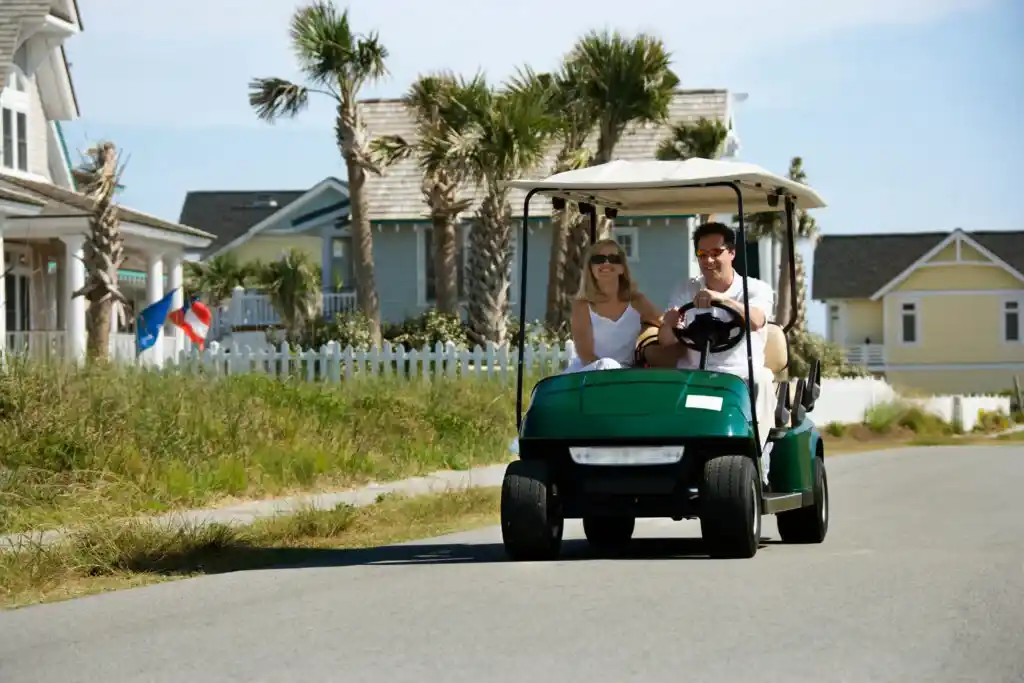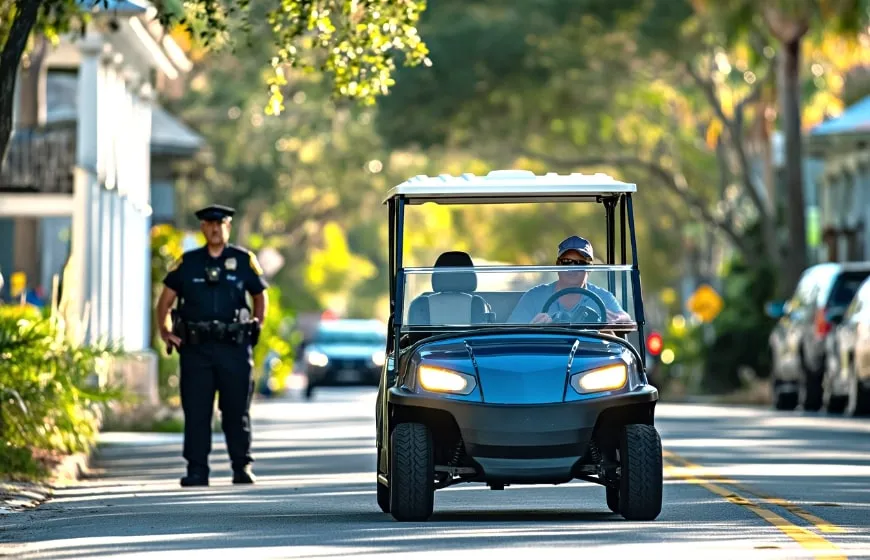
How Much Is a Golf Cart? Complete Pricing Guide 2025
Discover how much a golf cart costs in 2025 with our comprehensive pricing guide covering new, used, electric, and gas models plus ownership expenses.
Discover the real speed capabilities of golf carts, from standard limits to performance upgrades. Expert guide on golf cart speeds, safety, and maintenance.

Ever wondered just how fast a golf cart can really go? Whether you're using your cart on the golf course or as a neighborhood vehicle, understanding golf cart speeds is important for both safety and performance. In this guide, we'll break down everything you need to know about golf cart speeds, from factory settings to modified capabilities.
Most golf carts come with built-in speed limits for safety reasons. A standard golf cart typically runs between 12 and 15 miles per hour (MPH) right off the showroom floor. This speed limit isn't random - it's carefully chosen to balance safety with practical use on golf courses and in residential areas.
According to the American National Standards Institute, golf carts used on courses should maintain speeds under 15 MPH to ensure player safety. However, the actual speed your cart can achieve depends on several factors we'll explore below.
Quick Tip: Your cart's speed governor is usually set by the manufacturer and can be adjusted within legal limits by a qualified technician.
Standard golf carts from major manufacturers like Club Car, E-Z-GO, and Yamaha typically have these speed ranges:
Most new carts come equipped with a speed governor, which is a device that limits the cart's top speed. This is especially important for course-owned fleets where consistent speeds help maintain pace of play.
The power source of your golf cart can significantly impact its speed capabilities:
Electric Golf Carts:
Gas Golf Carts:
| Feature | Electric Carts | Gas Carts |
|---|---|---|
| Top Speed | 12-19 MPH | 15-20 MPH |
| Acceleration | Instant torque | Gradual power |
| Hill Performance | Good | Better |
| Speed Consistency | More stable | Varies with terrain |
| Maintenance Needs | Lower | Higher |
Modified golf carts can achieve significantly higher speeds, but it's important to note that modifications may affect street legality and warranty coverage:
Safety Note: Modified carts require additional safety features and may not be legal for street use in your area. Always check local regulations before modifying your cart.
The power system of your golf cart plays a crucial role in determining its speed potential:
Battery Systems:
New batteries vs. End of life
Full charge vs. Low battery
According to Golf Cart Resource, battery maintenance can affect your cart's speed by up to 20%. Regular battery maintenance includes:
The weight of your golf cart significantly impacts its speed and performance. Here's how different factors affect speed:
Weight Considerations:
Performance Tip: Removing unnecessary accessories and maintaining proper tire pressure can help optimize your cart's speed-to-weight ratio.
| Load Condition | Speed Impact | Hill Climbing |
|---|---|---|
| Empty Cart | 100% Speed | Excellent |
| Two Passengers | 90-95% Speed | Good |
| Four Passengers | 80-85% Speed | Fair |
| Maximum Load | 70-75% Speed | Limited |
Environmental factors have a major impact on golf cart performance:
Terrain Types:
Optimal conditions
Varies by grade
Course conditions
Weather impact
Golf cart speed limits vary by location and usage type. Here's what you need to know:
Legal Speed Limits:
Following these safety guidelines is crucial for preventing accidents:
Essential Safety Tips:
Keeping your golf cart well-maintained is key to maintaining optimal speed performance:
Maintenance Schedule:
Watch for these common problems that can affect your cart's speed:
Electrical Issues:
Mechanical Problems:
Before modifying your golf cart for increased speed, consider these legal options:
Approved Modifications:
For those seeking maximum performance, these upgrades can significantly boost speed:
High-Performance Options:
Important: High-performance modifications may void your warranty and require additional safety features. Always consult with a qualified technician.
| Upgrade Type | Speed Gain | Cost Range | Complexity |
|---|---|---|---|
| Motor | 5-10 MPH | $$$$ | High |
| Controller | 3-7 MPH | $$$ | Medium |
| Batteries | 2-5 MPH | $$$ | Medium |
| Tires | 1-3 MPH | $$ | Low |
| Gearing | 2-6 MPH | $$ | Medium |
A standard golf cart typically runs between 12-15 MPH out of the box. This speed is ideal for golf course use and most residential applications. Electric carts usually maintain more consistent speeds, while gas carts may have slight variations based on terrain and conditions.
Yes, golf carts can be modified to go faster through various upgrades:
Street legality depends on your location and the type of modifications:
To maintain optimal speed performance:
Several factors impact golf cart speed:
A typical golf cart motor draws between 400-600 amps during peak acceleration and 100-200 amps during normal operation. Electric golf cart motors usually operate at 36-48 volts and can draw up to 20-25 horsepower at maximum output.
New golf cart prices range from $5,000 to $15,000, depending on the model and features. Used golf carts typically cost between $2,000 and $5,000. Custom or luxury models can exceed $20,000. Electric models generally cost more than gas-powered ones.
The average golf cart weighs between 900-1,100 pounds without batteries. Electric golf carts with batteries typically weigh 1,200-1,500 pounds, while gas-powered carts usually weigh 900-1,000 pounds. Weight varies by model and additional accessories.
Title requirements for golf carts vary by state and local jurisdiction. Some states require titles for golf carts used on public roads, while others don't. However, most golf carts come with a manufacturer's certificate of origin, which serves as proof of ownership.
License requirements vary by location and usage:
Need help maintaining or modifying your golf cart? Find local repair services that can help optimize your cart's performance. Our directory includes certified technicians who specialize in:

Discover how much a golf cart costs in 2025 with our comprehensive pricing guide covering new, used, electric, and gas models plus ownership expenses.

Discover if you need a license to drive a golf cart with our comprehensive guide to state laws, age requirements, and legal regulations for golf cart drivers.

Discover the best golf push cart options of 2025 with our comprehensive guide comparing features, prices, and durability for every type of golfer.
Get the latest updates on golf cart services, tips, and exclusive offers delivered to your inbox.